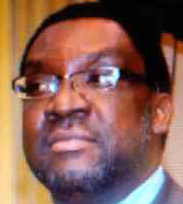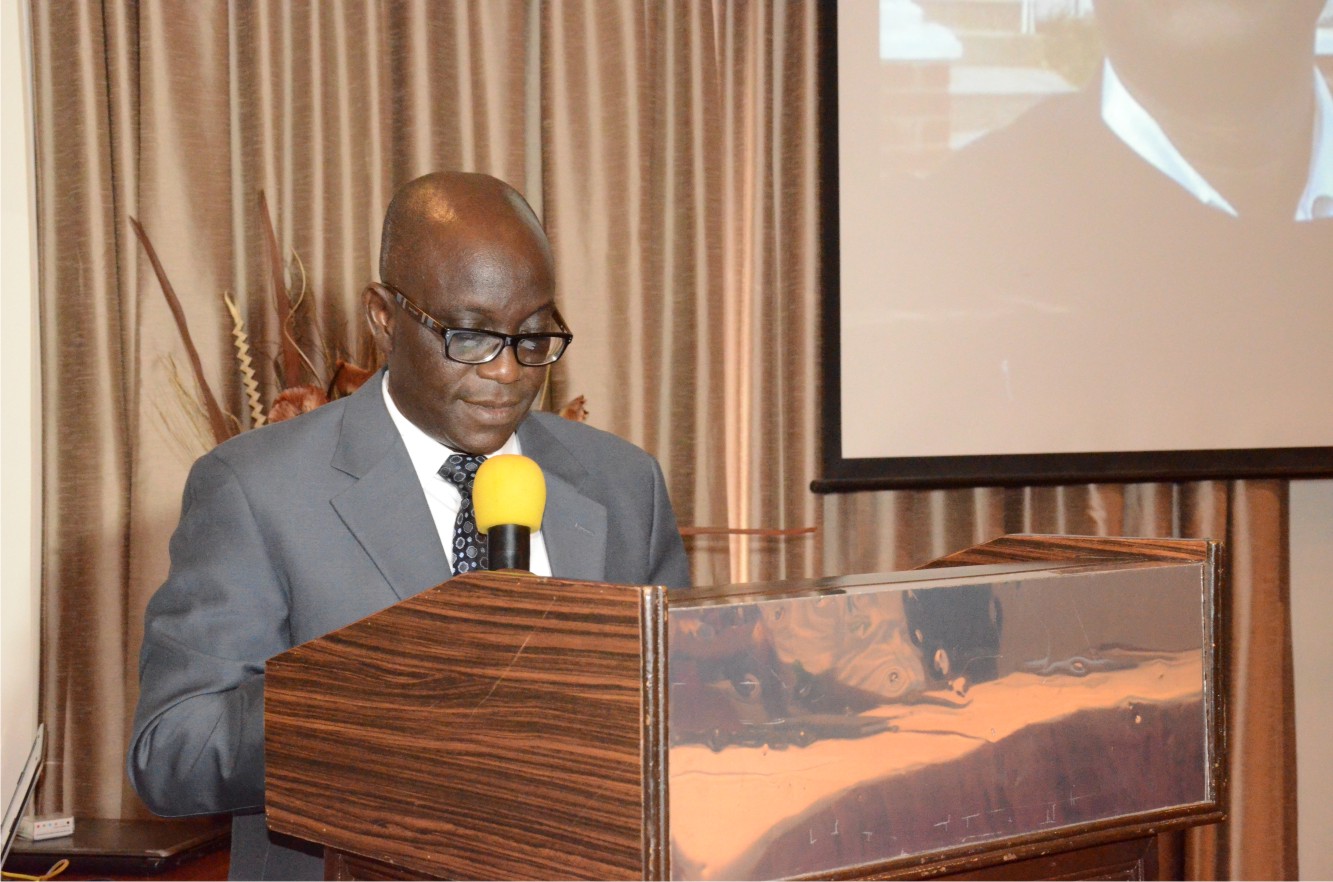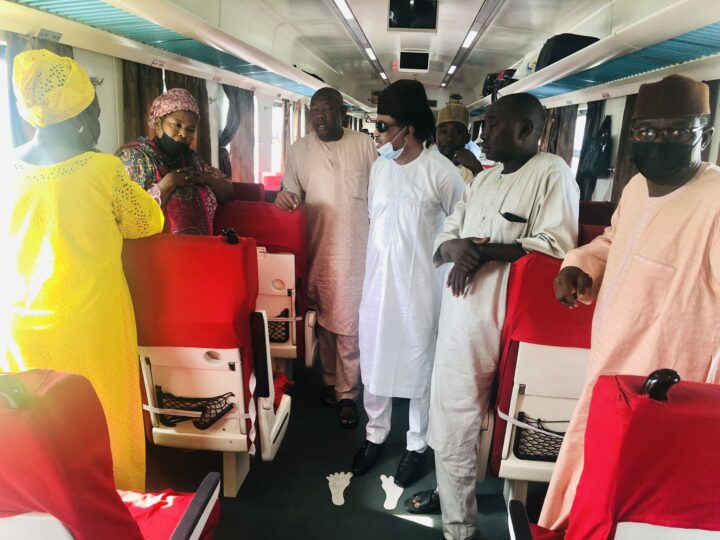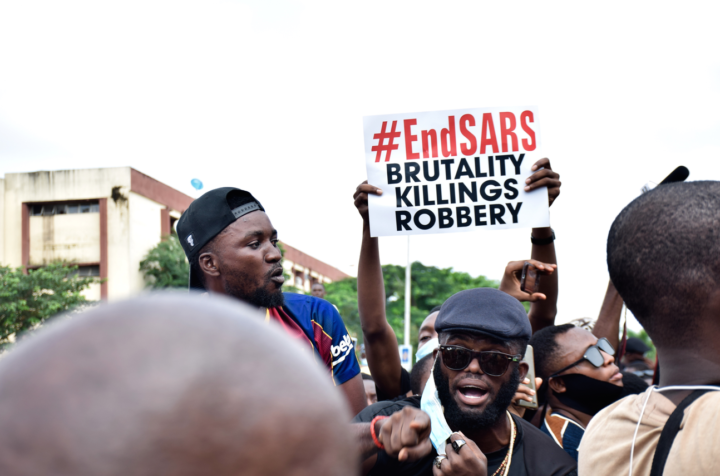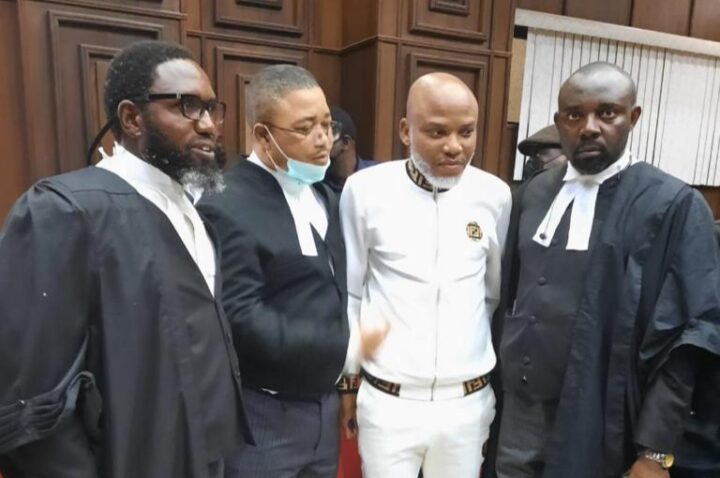MR GBENGA ADEFAYE, MD-EDITOR IN CHIEF, VANGUARD NEWSPAPER GIVING THE KEYNOTE SPEECH AT THE EVENT
“So, do you play the keyboard, young man?”
The soft but firm voice that intruded into my thoughts was meant for my ears alone, even when it was not a whisper.
I looked up to see his dark, bespectacled face. Before I could respond, he had asked to occupy the empty seat beside me so that he could be positioned between me and another media executive with whom he had a long tete a tete at the entrance.
His demeanor was friendly but somewhat guarded. His gaze, blazingly penetrating as if he wanted to unravel everything about you at one glance.
Advertisement
“I toy with the piano sir, but…”, I was going to give him a short introduction into my world. But he politely cut me short to say the programme we came for was about to start and that we would talk in detail later.
He was very attentive to have observed my right hand positioned on the table with my fingers moving rhythmically as though I was playing an imaginary piano.
That, in December 2007 or thereabouts, was my first one-on-one encounter with the man then fondly known as the Dean of the Nigerian Editors’ League, Mr. Gbenga Francis Adefaye.
Advertisement
The occasion under reference was a media parley to which editors and media executives were invited to, somewhere in Lagos. And given that such events tended to start a bit late, after a long-drawn exchange of pleasantries, I would normally choose to observe and commune with myself as a freshly-minted daily editor, with the blackberry phone as my other hidden companion whenever self-communion became tiring or interrupted.
The Dean, Mr. Adefaye was so hailed, given that he was the longest-serving daily editor as at that time (I believe his namesake, Gbenga Omotoso, would later dispossess him of that title after his (Adefaye’s) elevation as the GM/Editor-in-Chief of Vanguard Newspapers).
From the get-go, I noticed that he was a keen observer, a good listener, and a thorough-bred professional who was fiercely proud of the journalism profession.
We became very close when, between himself and my former boss at The Punch, Mr. Azu Ishiekwene, with the blessing of the Managing Director, Mr. Ademola Osinubi, decided that I should run for a position on the Standing Committee of the Nigerian Guild of Editors (NGE) in 2008 because Mr. Adefaye had been tipped to become the next President of the Guild.
Advertisement
The next four years of the Adefaye Presidency at the NGE brought us exceedingly close. Although I was the Assistant Secretary-General and later Vice-President (West), I was like his Right-Hand-Man throughout the four years.
He in fact became the easy-going but philosophy-inclined elder brother I never had. And has meant more to me over the years as a senior colleague turned occasional personal tutor whose shoulders were always available to lean on.
His title, for me, changed from 2008 and has remained so up till today. He simply became “Presido”, and most people close to me, either at home or in the office, knew (and still know) once that title was mentioned, it was Mr. Adefaye that was in reference.
With him, we are constantly sharing knowledge on the Nigerian media landscape and the type of role that an organisation like the NGE ought to be playing in the scheme of things.
Advertisement
Those who jocularly refer to him as the ‘High Priest’ in the “politics” of the Guild do so simply to acknowledge his influence and likeable personality as a rallying point and an unrelenting but unobtrusive goal-getter.
Looking at what his period at the headship of the Guild was able to bring about, aside from the undeniable respectability and quality image, hardly anyone would argue that this gentleman has been a blessing to the Nigerian media.
Advertisement
The partnership with the Pan-Atlantic University’s School of Media & Communications; the commercial house bought in Magodo, Lagos whose annual rent provides a buffer towards the day-to-day running of the NGE secretariat; the groundwork for the Editors House in Lagos and the NGE land in Abuja as well as the ceaseless support and encouragement were given to members in the areas of capacity building and publication/documentation are some of the Adefaye footprints and indelible legacies at the NGE, for which he deserves some accolades.
But he did more in the area of soft touches with members, fellows, and associates.
Advertisement
It was out of his concern, which Mrs. Funke Egbemode and I picked on, that encouraged the Standing Committee members and other Editors to make a sing-song of the concept of ‘life after the editor’s seat’ at every of the Guild’s annual All Nigerian Editors Conference (ANEC) since 2010 or thereabouts.
The idea was to always use part of the last day at ANEC to discuss ourselves and things of importance to our career, life, and retirement.
Advertisement
Indeed, this was one area of life in which Presido and I have always shared perspectives and exchanged ideas.
He would always remind me that “our job was not pensionable”, at least for the majority of journalists working in the private sector and that it was imperative to always think of life after the editor’s seat and in retirement.
Which perhaps was the reason why under his headship of the NGE, every editor that published a book was assured of some financial support for 10 copies of such a book. Every book published by an editor, and indeed by a journalist in Nigeria, he would insist, ought to be on the shelf at the Guild’s secretariat.
In 2012 when Alhaji Kola Animasaun (may the Almighty bless his soul) had a three-in-one celebration – his retirement from Vanguard Newspapers as Chairman Editorial Board, his 73rd birthday and the unveiling of his biography: ‘1939’, it was my humble self that Mr. Adefaye asked to review the book at the well-attended event, which held at the Nigerian Institute of International Affairs (NIIA) in Lagos.
Impressed with the quality of the review, which I titled ‘From 1939 To The Vanguard Of Moderm Journalism: The Story Of A ‘Musulumi’, Uncle Sam Amuka-Pemu, the doyen of Nigerian journalists and Publisher of Vanguard Newspapers, together with Alhaji Animasaun, decided to send a token of appreciation through Presido.
But I tried to refuse, thinking the book review was my contribution in celebrating Alhaji Animasaun. But Presido would have nothing of it. “Buy a bottle of wine” he said, “and use the rest to buy blocks and cement for the house you are building. Every kobo counts.”
His message was clear and reasonable as always!
That was vintage Gbenga Adefaye, always looking out for those who meant something to him!
He hardly ever missed his annual leave, always stressing the need to recalibrate because the work would proceed without the indiscretionary workaholic.
The many times that I have travelled with him within Nigeria and a couple of times outside the country, I have come to appreciate him the more for his balanced lifestyle and for always picking a new set of books on each trip.
But none of the good times I have shared with him compares to those we did together with Uncle Sam (Amuka-Pemu). Presido made the periodic Sunday dinners at Uncle Sam’s Anthony Village, Lagos Guest House possible and something to always look forward to and cherish.
However, as time went by, Presido would look for a reason to miss the dinner, with the excuse that he was out of Lagos.
“It’s you Uncle Sam wants to see. Don’t keep him waiting. He’s expecting you,” he would subtly instruct in those fairly regular SMSs. Only he knows why he wanted Uncle Sam and I to bond very well, even when I’d left the newsroom for public service.
And bond we did with the irrepressible Uncle Sam.
It’s in fact the type of materially modest but intellectually and socially rich life of Uncle Sam that Presido often used in assuring me and others that a dutiful newsman should approach his old age with grace and contentment.
How sad then to read of an unsavoury incident some years ago when someone shared false news about Uncle Sam and tried to no avail to blackmail him.
But the media man in Presido would always look for lessons to be learned in all of life’s vagaries and how a journalist should be worried that the profession may be losing ground to the growing scourge of quacks, fake news, and misinformation.
His response to that particular incident aped the position of the legendary 18th-century Irish satirist, Jonathan Swift, to conclude that “falsehood flies and truth comes limping after it”… and that “a lie can travel halfway around the world while the truth is still putting on its shoes.”
If we look at what the downside of social media has turned the business of news gathering and dissemination to and how truth and professionalism seem to be struggling amidst the deluge of misinformation and fake news these days, Jonathan Swift’s position and Gbenga Adefaye’s concurrence can be better appreciated.
With his time now as the Provost of the Nigerian Institute of Journalism (NIJ), hopefully, the media landscape may not despair further with the type of new orientation that the relentless newsman, administrator, and tutor in Adefaye is bringing to the institution and to the younger generation of journalists.
As he climbs with grace unto the sixth floor that is full of diamonds, may he be blessed with many more years in good health.
And may he continue to be a shining example to the younger generation of committed newsmen whose voices deserve to be heard like this Ile Ife-born big brother and buddy of mine.
Ayorinde, a former Commissioner for Information & Strategy in Lagos State, is the CEO of Patrons Media Ltd and Publisher of The Culture Newspaper (TCN)
